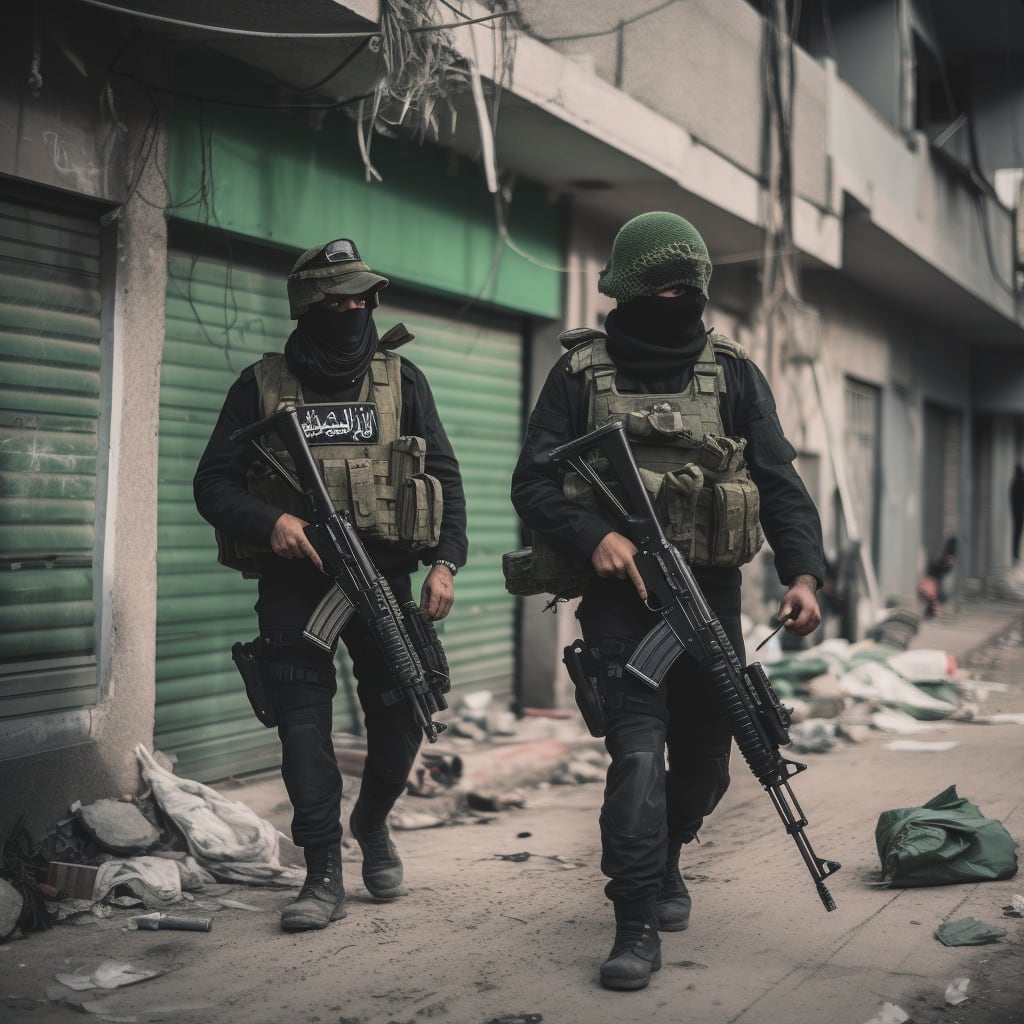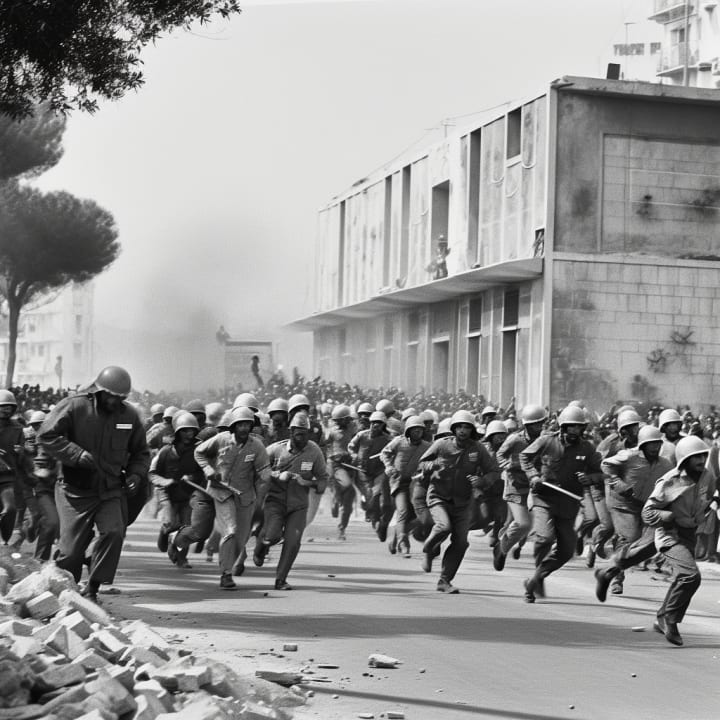The rise of HAMAS
and what we have to expect

Hamas (an Arabic acronym for “Islamic Resistance Movement”) emerged in the 1980s as an offshoot of the Egyptian Muslim Brotherhood. As an Islamic fundamentalist political and militant organization, Hamas has controlled Gaza since 2007 after winning Palestinian legislative elections in 2006. While labelled a terrorist organization by countries such as the United States, Hamas views itself as a legitimate resistance movement defending Palestinian rights against Israeli occupation. This article will provide an overview of Hamas’ origins, ideology, militant activities, governance of Gaza, relations with other Palestinian factions, and future prospects.
Origins

Hamas was founded during the First Intifada uprising against Israeli occupation in 1987, originally growing out of the Palestinian branch of the Muslim Brotherhood. The outbreak of the Intifada presented an opportunity for the Brotherhood to participate actively in the struggle against Israel. Hamas leaders such as Ahmed Yassin, Abdel Aziz al-Rantissi, Mahmoud Zahar, and Said Seyam had been meeting since the 1970s to discuss escalating activities against the occupation. Hamas published its charter in 1988, seeking to consolidate its ideology and objectives.
The Hamas charter outlines the organization’s credo of radical Islamic nationalism and anti-Semitism modeled after the Muslim Brotherhood. It advocates waging jihad to liberate all of historic Palestine and rejects negotiations or compromises with Israel. The charter blends anti-Semitic conspiracy theories about supposed Jewish world domination with calls for Israel’s destruction. However, some analysts argue the charter no longer accurately reflects Hamas’ policies and objectives, as the group has moderated and recalibrated some positions over time.
Militant Activities
During the 1990s and 2000s, Hamas carried out numerous deadly attacks against Israeli military and civilian targets. Tactics included suicide bombings, shootings, kidnappings, rocket attacks, and raids. Some of Hamas’ most notorious attacks include the killing of 13 Israeli soldiers in an ambush in 1993; the 1994 suicide bombings of buses in Tel Aviv and Netanya that killed 32; the 1997 1997 suicide bombings at the Ben Yehuda Street pedestrian mall that killed 20; the 2001 Dolphinarium discotheque suicide bombing that killed 21; and the 2002 Passover massacre that killed 30 and injured 140 at a Netanya hotel.
Hamas’ militants organized into the Izz ad-Din al-Qassam Brigades, which was established in either 1992 or 1993. During the 1990s and 2000s, the Brigades carried out deadly attacks on both military and civilian targets like shooting attacks on Israeli settlements in Gaza. The al-Qassam Brigades specialized in suicide bombings of Israeli buses, cafes, shopping malls. Hamas also built an extensive network of tunnels under Gaza for smuggling weapons and supplies as well as infiltration into Israel. The group’s leadership went underground to escape being targeted by Israel.
After claiming responsibility for numerous attacks in 2001–2004 during the Second Intifada, Hamas was designated as a terrorist organization by countries such as the United States, Canada, Japan and the United Kingdom as well the European Union. However, Hamas considers its armed activities legitimate acts of resistance rather than terrorism.
Electoral Successes
In January 2006, Hamas won a surprise victory in Palestinian parliamentary elections, gaining 74 out of 132 seats. Their success resulted from widespread disillusionment with the ruling Fatah party’s perceived corruption and inability to make progress towards Palestinian statehood. Many Palestinians also endorsed Hamas’ rejection of the Oslo peace process and advocacy for armed resistance. The election results were a shock that prompted sanctions from Israel and western donors.
Despite not initially recognizing Israel, Hamas indicated an openness to accepting a Palestinian state in the territories occupied in 1967 contingent on a long-term truce. However, the movement continues to not recognize Israel’s legitimacy or right to exist.
Governance in Gaza
Tensions escalated between the ruling Hamas party and Fatah faction after Hamas’ election victory. The political conflict turned into open civil war in Gaza in 2007 after Hamas forcibly expelled Fatah officials and security forces from Gaza. Hamas has governed Gaza as a de facto one-party state since 2007, while Fatah retained control of Palestinian-administered areas in the West Bank.
Hamas governance in Gaza has been authoritarian, limiting political freedoms and civil liberties. The group has imposed aspects of its radical interpretation of Islamic law, restricting women’s rights and regulating social behavior. However, Hamas has also shown pragmatism and flexibility in power, making alliances with merchant families and underground groups, and not going as far in instituting religious law as some other Islamist militant groups like the Taliban.
Hamas rule in Gaza has been undermined by joint Israel-Egypt border closures and blockades after Hamas took power, severely restricting trade and movement. Israel has launched multiple significant military operations against Hamas and other militant groups in Gaza, including airstrikes and ground invasions in 2008–09, 2012, and 2014. These conflicts have resulted in heavy civilian casualties and damage in Gaza, along with Israeli military and civilian deaths from rocket fire.
Hamas has sought to govern and provide services including healthcare clinics, social programs, infrastructure, and schooling. However, conditions in Gaza under Hamas rule and blockade have been extremely challenging, plagued by poverty, deprivation, infrastructure deficiencies, aid dependency, and lack of economic development.
Relations with Other Palestinian Factions
Hamas has a complex relationship with the more secular nationalist Palestinian groups like Fatah and the Palestine Liberation Organization (PLO). There is a long history of mutual mistrust and competition for political influence. After 2006, the West Bank-Gaza split resulted in Fatah governing in the West Bank and Hamas ruling Gaza as separate political entities with friction and hostility between them.
However, Hamas and Fatah have managed to cooperate and form unity governments at times, such as the 2011 Cairo agreement and 2014 unity government, although these have proved short-lived. There have been multiple failed reconciliation attempts and agreements. Yet the divided Palestinian leadership remains a roadblock to negotiating a peace settlement or unified governance.
There are significant ideological divides between Islamist Hamas and the secular Palestinian nationalist factions. Hamas has prioritized “resistance” against Israel and rejected the past PLO approach of negotiating political solutions. Hamas opposed the 1993 Oslo Accords between the PLO and Israel, which it saw as a betrayal of Palestinian national and religious rights. But its own evolving stances toward accepting a Palestinian state in the 1967 occupied territories signal greater pragmatism.
Future Prospects
Hamas currently faces major challenges and uncertainties about its future direction. Its governance in Gaza has failed to improve conditions for most residents. Its rocket and tunnel capabilities have been degraded by Israeli military strikes and restrictions on weapons smuggling. Regionally, it lost an ally after the overthrow of Egyptian Muslim Brotherhood President Morsi in 2013. The stalled reconciliation process means no deal with Fatah on holding elections or unity governance is on the horizon.
With little hope left for a negotiated two-state solution, the Hamas strategy has largely shifted to simply maintaining its power in Gaza as leverage while waiting out bigger shifts in the conflict. Its objective remains ending the Israeli occupation and blockade and forming a future Palestinian state. But its room for maneuver is heavily constrained by Gaza’s isolation and Israel’s control over crossings and borders.
Looking ahead, several potential scenarios could unfold:
- Hamas and Fatah restart reconciliation talks and agree to elections and power-sharing, reuniting the West Bank and Gaza under centralized governance. However, past failed attempts make the chances of genuine unity slim.
- Israel launches another major military offensive against Hamas and militant groups in Gaza to degrade capabilities, perhaps re-occupying Gaza. However, this would come at a heavy cost and likely not finish Hamas due to its adaptability.
- Egypt leads negotiations for a long-term ceasefire between Hamas and Israel, easing the blockade of Gaza in exchange for Hamas maintaining calm. This could gradually normalize Gaza’s status but leave Hamas entrenched in power.
- Internal challenges or loss of public support undermine Hamas’ standing in Gaza, prompting compromises with rival groups. However, there are no signs yet of Hamas losing its grip on control.
- The dynamics of the wider Israeli-Palestinian conflict shift, prompting Hamas to moderate stances and participate in future peace negotiations. However, current trends make a diplomatic breakthrough seem unlikely.
Hamas’ future course will depend on leadership decisions, relations with regional allies like Turkey/Qatar, and population pressures in Gaza. For now, Hamas looks set to retain its control and political role for the foreseeable future while stopping short of recognizing or directly negotiating with Israel. But deprived conditions for Gazans and stalled reconciliation talks could potentially prompt strategic shifts down the road.
This was all before the wellknown attack.Now we are on the brinck of something BIGGER.
This most likely will fall on all our heads, if there is no solution fast!





Comments
There are no comments for this story
Be the first to respond and start the conversation.